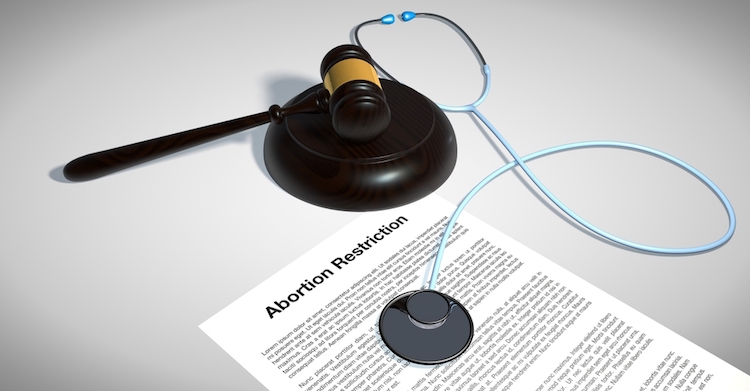Federal judge who blocked Texas abortion law cites these reasons for US standing to sue

Image from Shutterstock.
The federal government has standing to sue over Texas’ restriction abortion law, a federal judge ruled Wednesday, when he blocked the law as “flagrantly unconstitutional.”
U.S. District Judge Robert Pitman of the Western District of Texas enjoined enforcement of the law, known as SB 8, in a decision Wednesday. His preliminary injunction bans the state of Texas and its agents—including state court judges and court clerks—from accepting and hearing lawsuits seeking damages under the law.
Pitman ruled in a suit filed in September by the U.S. Department of Justice. The law at issue bans abortions in Texas after a fetal heartbeat is detected, which happens at about six weeks of pregnancy.
Pitman said the law “was designed to stymie judicial review” because it switched enforcement to the general public, which may seek $10,000 or more in damages in lawsuits against anyone who aids an abortion. The provision appeared to be intended to stop abortion providers from suing the state in federal court to block the law.
“It is the intentional design of the law by state actors for the chief purpose of avoiding judicial review that sets it apart—and makes it particularly likely to be appropriate for this court to enjoin,” Pitman wrote.
Pitman said he could issue an injunction against Texas because “the state has its prints all over the statute.” Republican Texas Gov. Greg Abbott signed the bill into law, the state created a private enforcement scheme, the state judiciary must hear SB 8 lawsuits, and the state must carry out court orders regarding the law.
Pitman said the federal government has standing to sue for two reasons. First, the law impedes the federal government’s authority to provide abortion-related services as mandated by regulations, statutes and caselaw.
Federal prisons are required to arrange for inmate abortions and to pay for the procedure when the pregnancy is due to rape or incest, Pitman said. Other federal agencies, including the Department of Defense, are required to provide or allow abortions in certain circumstances.
Second, Pitman said the federal government had parens patriae standing to sue to vindicate citizens’ constitutional rights. States have long had the authority to bring such suits, but U.S. Supreme Court dicta indicates that the federal government can also bring such suits, he said.
The parens patriae suit is supported by the federal government’s “indisputably sovereign interest” in vindicating its citizens’ constitutional rights and ensuring that those rights can be enforced in federal court, Pitman said.
As an alternative standing ground, Pitman cited an 1895 case, In re Debs, which stemmed from the Pullman rail strike. The Supreme Court held in that case that the United States had the authority to sue private parties for injunctive relief because the strike was obstructing interstate commerce.
The reach of the Debs decision has been debated.
“In the absence of additional guidance from the Supreme Court and the 5th Circuit as to the scope of Debs’ standing analysis,” Pitman said, “this court finds that Debs supports standing where the government’s interest is preventing harms to ‘the general welfare’ and the ‘public at large.’”
Debs’ standing is established, however, even if the decision is read narrowly to support standing only in cases involving interstate commerce, Pitman said.
The Texas law implicates interstate commerce by sending Texas residents across state lines to get abortions, which burdens out-of-state clinics and impedes other state residents from getting abortions because of backlogs.
Other impacts on state commerce include “insurance companies reimbursing Texas abortions, banks processing payments, medical device suppliers outfitting providers, or persons transporting patients to their appointments,” Pitman said.
“Satisfied that the United States has standing to seek injunctive relief to vindicate the rights of its citizens, uphold the primacy of the Constitution, and safeguard our republic’s system of law against the state’s aggressively defiant acts, this court holds that it has the authority to enjoin the state of Texas,” Pittman said.
Among the publications covering the ruling are the Associated Press, Law.com, the Washington Post and the New York Times.
The case is United States v. Texas. Texas plans an appeal.
See also:
ABAJournal.com: “Convicted ex-lawyer files bizarre suit against doctor under Texas abortion law”
ABAJournal.com: “DOJ explores ways to challenge Texas abortion law; judge grants TRO against anti-abortion group”
ABAJournal.com: “How could the DOJ counter Texas abortion restrictions? Law prof suggests prosecution”
ABAJournal.com: “SCOTUS formally rejects request to block Texas abortion ban”



